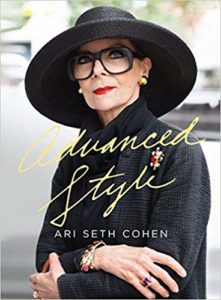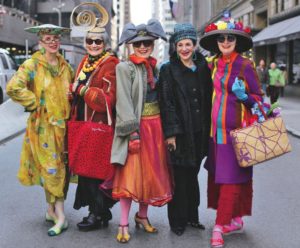In 2014, an incredible book came out called Advanced Style by Ari Seth Cohen, followed very shortly after by a documentary of the same name. It followed a number of stylish women of “advanced” age (thus the title) in New York City who dress in what is considered a maximalist way.
 What strikes me when watching them on screen or flipping through the pages of the book is how the proportions and the mix of everything they wear just works. Instead of being too much, wearing six different colors or patterns at once looks right. This is what the trend of maximalism is all about.
What strikes me when watching them on screen or flipping through the pages of the book is how the proportions and the mix of everything they wear just works. Instead of being too much, wearing six different colors or patterns at once looks right. This is what the trend of maximalism is all about.
To me, I see joy. The pleasure they get from the outfits they put together is clear. As we get to know them through the pictures in the book and through the documentary, we feel joy as well. They believe in what they’re wearing. They know themselves and they love every item. They’ve carefully collected each piece, finding them at luxury stores or vintage sales or flea markets, mixing any and all of them together, heeding only their own rules. They are the early adopters, the fashion leaders, of the resale market trend!
Just a few of the resale brands you may have heard of in the news recently are The RealReal, Poshmark, and threadUP. An article in Yahoo! Finance released a report on March 19 predicting the resale apparel market will be worth $51 billion within five years. Not everyone who buys vintage or pre-owned clothing wears the pieces in a maximalist way, but almost everyone who buys them loves to tell the story of how they acquired each piece. The story is as much of the outfit as the actual garment.
Iris Apfel, a 96-year-old style icon and major Influencer on Instagram, is well-known for saying, “More is more and less is a bore.” That perfectly describes the essence of maximalism.
 I’m here to tell you a secret though. As brands, we can be maximal even when we are showing individual styles or looks that are definitely not maximal. Think about how many white, black and grey tee shirts and woven shirts and jackets we sell in the promotional products industry! Companies want to put their own colorful logos on those items and they don’t necessarily want to have the color of the garment compete for attention.
I’m here to tell you a secret though. As brands, we can be maximal even when we are showing individual styles or looks that are definitely not maximal. Think about how many white, black and grey tee shirts and woven shirts and jackets we sell in the promotional products industry! Companies want to put their own colorful logos on those items and they don’t necessarily want to have the color of the garment compete for attention.
Also, many people want to have a minimalistic wardrobe when it comes to color. White, black and grey items all mix and match, stretching a small wardrobe easily across a whole year. There is a movement to reduce the number of things in our closets (think Marie Kondo). Having a particular set of clothing you can layer up or pare back to accommodate for temperature, career, lifestyle or setting is becoming a trend to pay attention to.
Take another look at the image at the top of this page. Do you see how I’ve incorporated a mix of patterns through the ties, pants and shoes I’ve chosen for the models? Those patterns are paired with the SanMar items District Women’s Perfect Tri Tee (DM130L) in white and the Slim Fit SuperPro Oxford Shirt (S661) in white. That’s minimal color but presented in a maximal way. I’ve used as many patterns as are appropriate for my looks and I’m showing them on a bright yellow background with red accents. It definitely gets your attention while not taking away from the core products I want to show you.
Whether or not maximalism is for you as a way you want to dress personally, what we can all take away from this style is the joy that it can bring both the wearer and the observer. To me, that makes this a trend I hope stays around a long time, don’t you?
